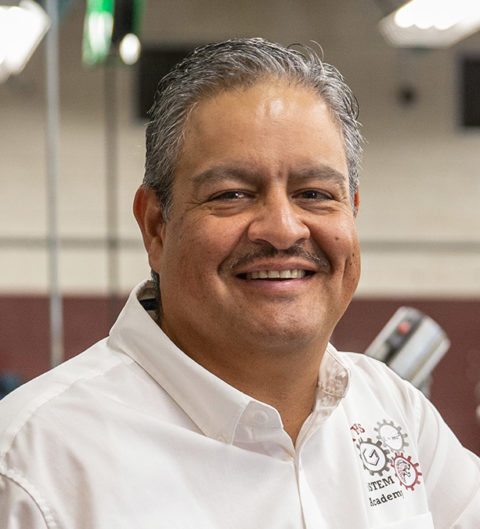“I can help students to understand that hard work can create opportunity, breaking a cycle of poverty. I love seeing students learn that they can design and create, and that they have talents and skills that are valued…. There is no greater joy for me then seeing my students begin to experience a sense of economic security and professional achievement.”
An educator since 2007, Cesar Gutierrez began teaching manufacturing at Tucson, Arizona’s Desert View High School in 2012, where he helped create the iSTEM Academy. iSTEM was a response to local employer concerns that prospective employees in the defense and aerospace industries were in short supply. Working with those employers, Gutierrez joined other educators to build pathways to connect students to manufacturing careers, starting with a class of 44 students. Today, the iSTEM Academy serves 300 of Desert View’s 2,150 students each year. Eighty percent of students are Latino and 90 percent qualify for free or reduced-price lunch. Gutierrez believes his role as a teacher is to empower students and, by doing so, transform a community and break the cycle of poverty.
Gutierrez’s students can receive up to 25 college credits—nearly a full year of school—toward their associate degree in industrial technology, thanks to a partnership with Pima Community College. In class, his students take ownership of their education by pursuing project-based learning. “Project-based learning helps solve the four little words that educators dislike the most, ‘I don’t get it,’” Gutierrez said. Projects help his students retain and understand information, apply math, English and science and learn about entrepreneurship. Each year, students form teams to design and manufacture products for contracted jobs, from building tables for the school’s culinary arts programs or crafting metal signage or parts for local companies. In the 2018-2019 school year, students worked together to create solar-powered golf carts, airplane parts and redesigned sewing machines.
Gutierrez’s students have a 100 percent graduation rate in a state where the average is below 80 percent. Eighty-two percent of his students graduate with post-secondary credit, and all have participated in work-based learning by the time they receive a diploma. Gutierrez notes that his program offers a variety of career pathways to students—he cites students who have taken their manufacturing background to college to learn mechanical engineering, to create a line of jewelry, and to serve in human resources at manufacturing companies. “Accolades aside,” he said, “our students have high expectations and the confidence to take on any project.”
“The biggest secret to this program is that we allow our students to invest and take part in their own education. Our students lead the curriculum and their passion drives the program. Each and every student owns the right to their educational process and the amount of hard work, dedication, and passion… allows them to be successful and come closer to accomplishing their dreams.”
